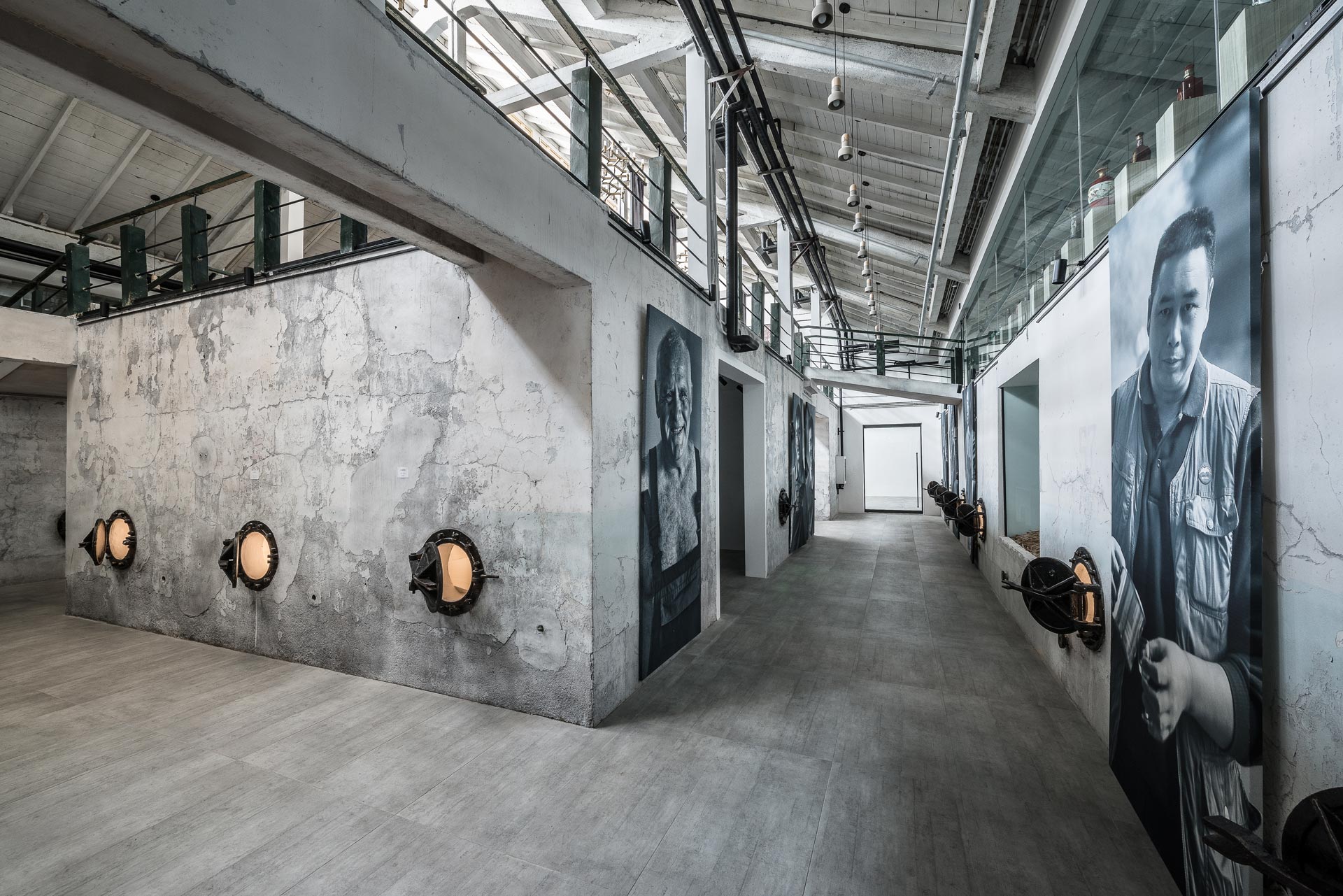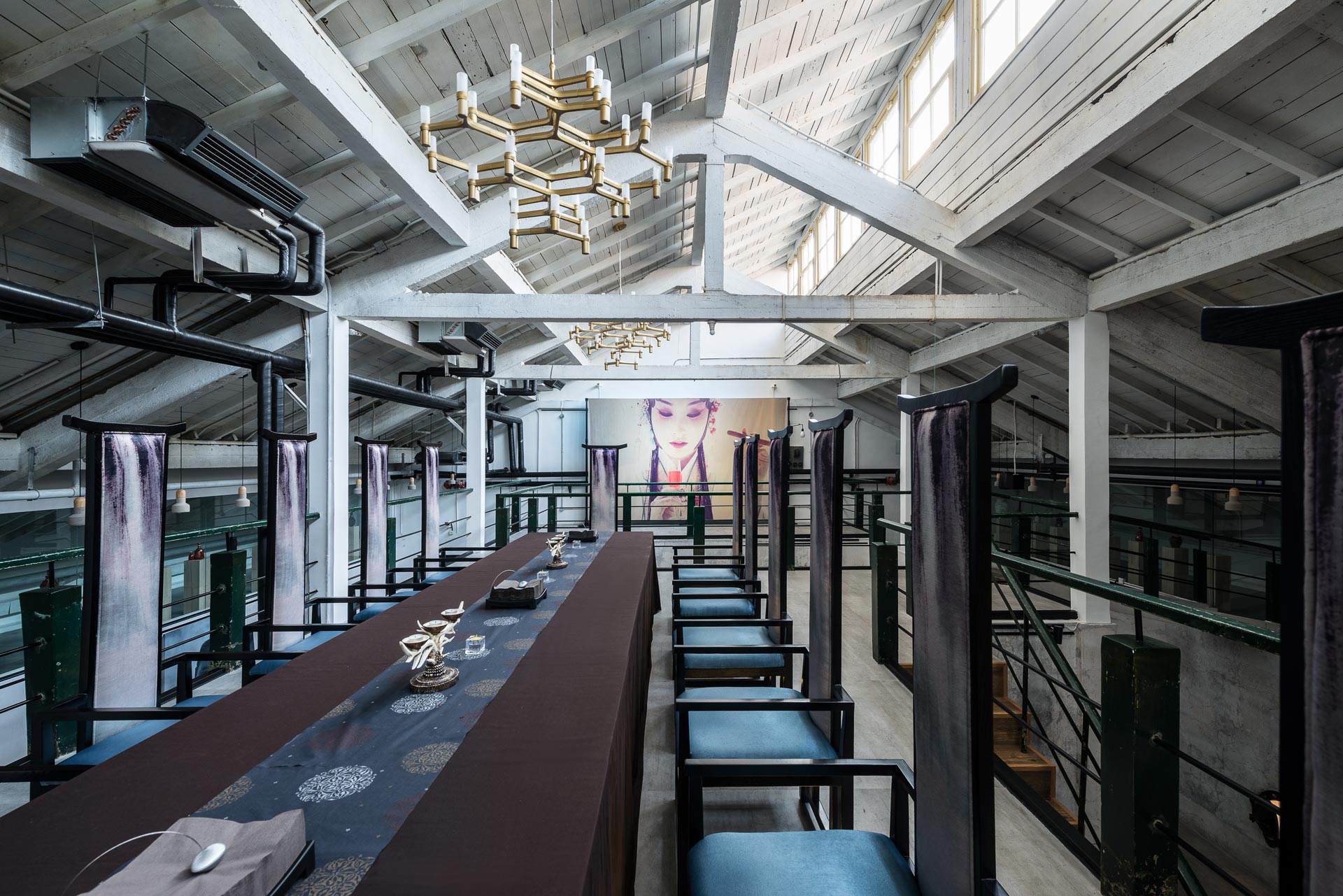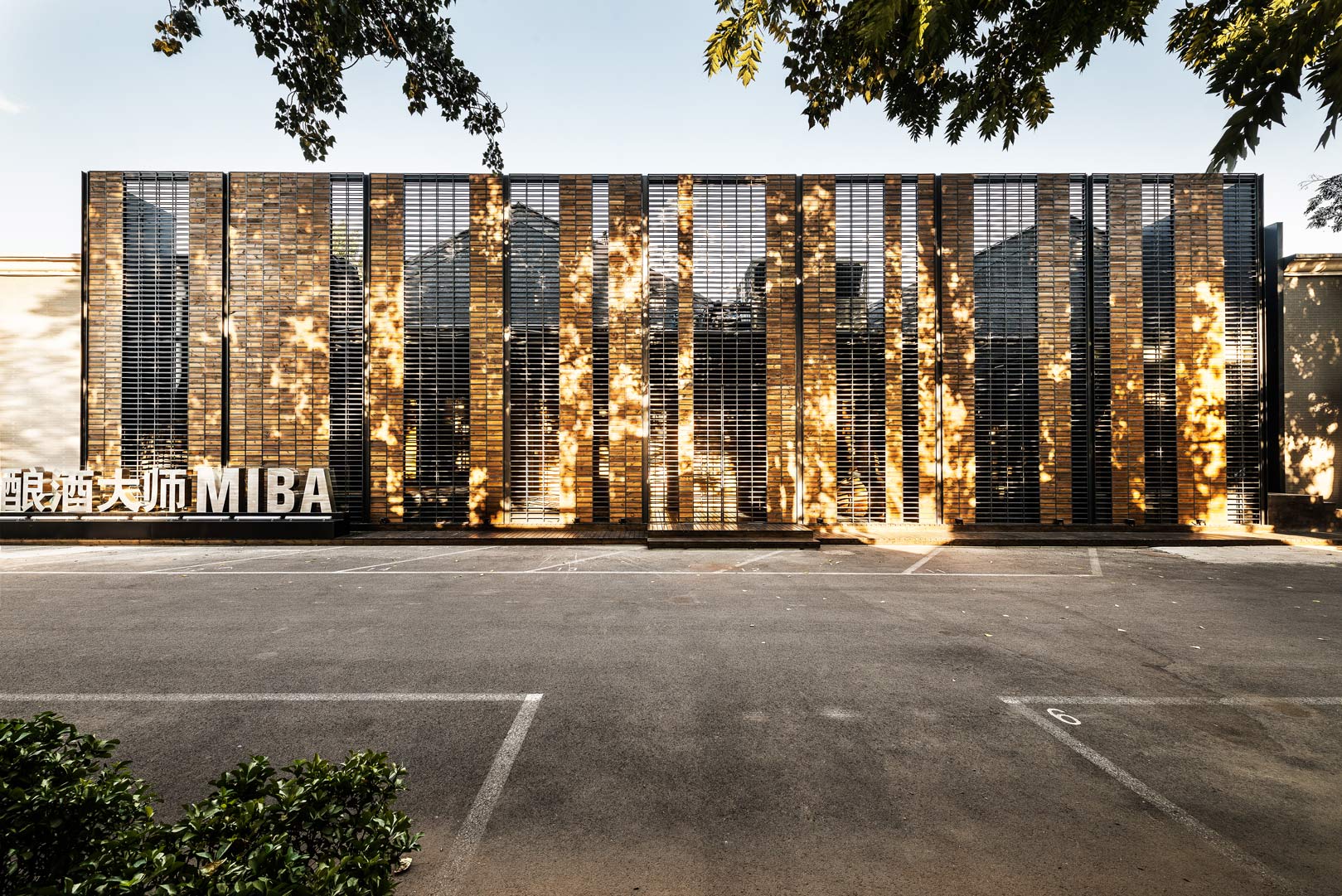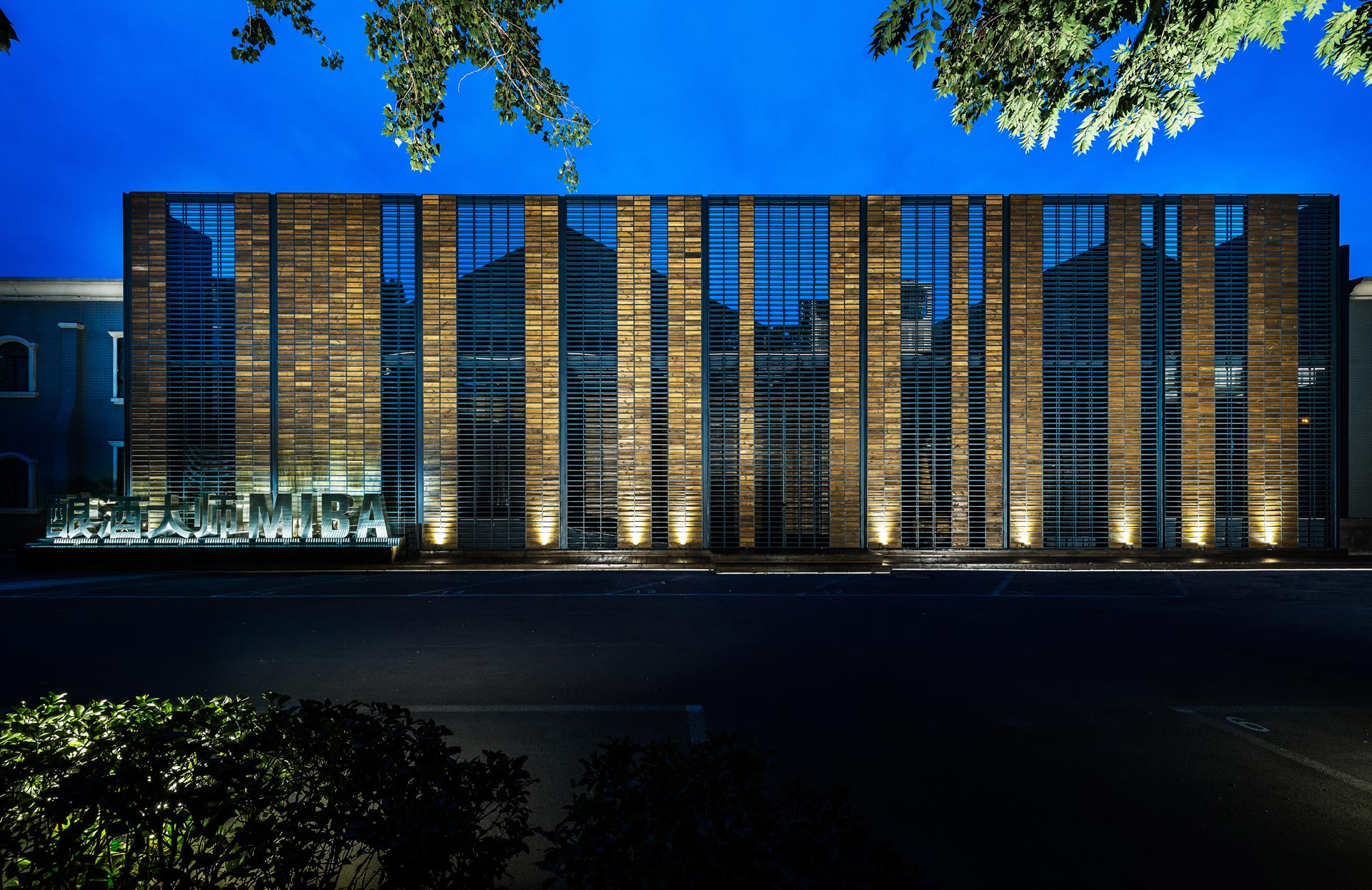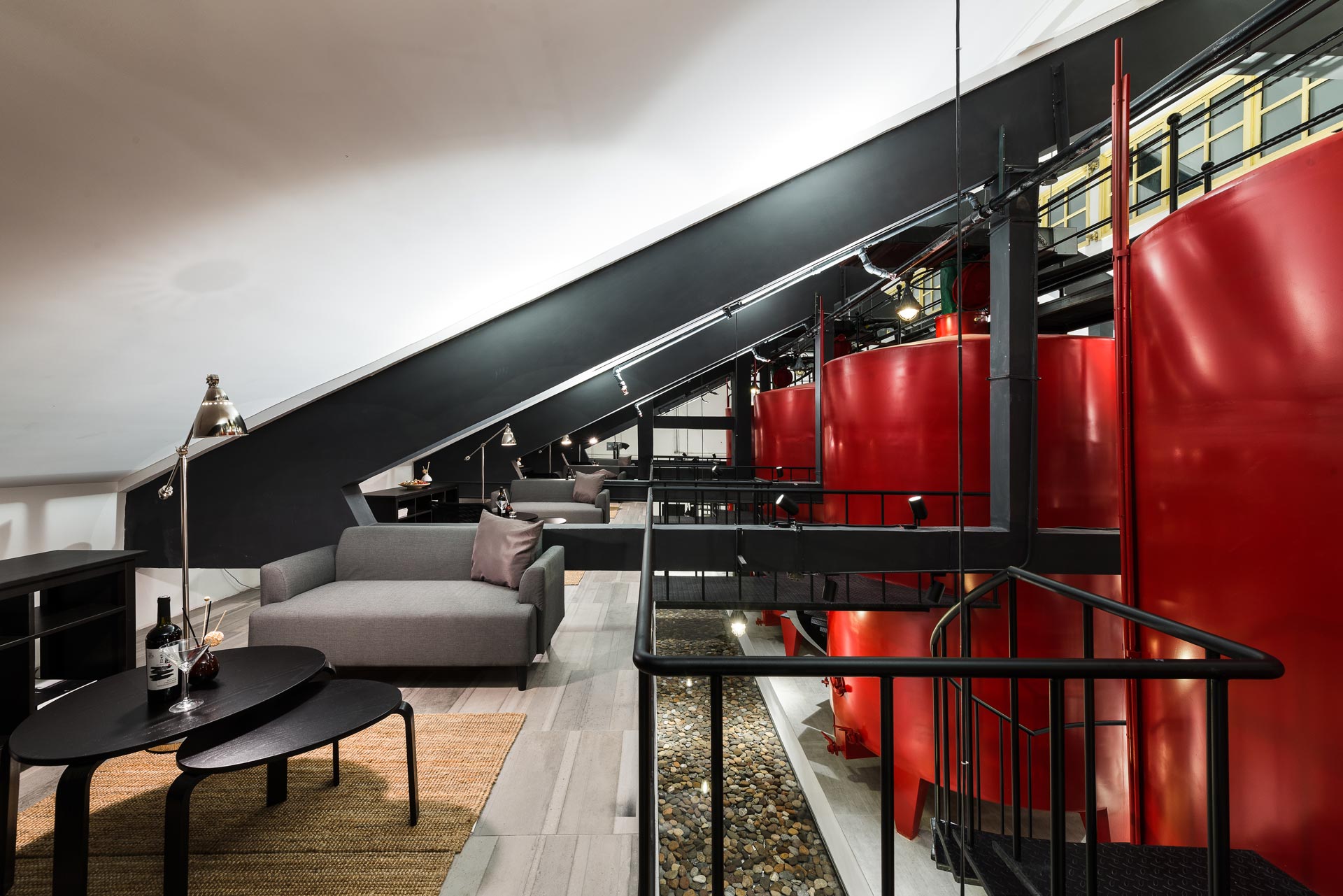Completion Year: 2016
Status: Beijing
Completion Year: 2016
Status: Beijing
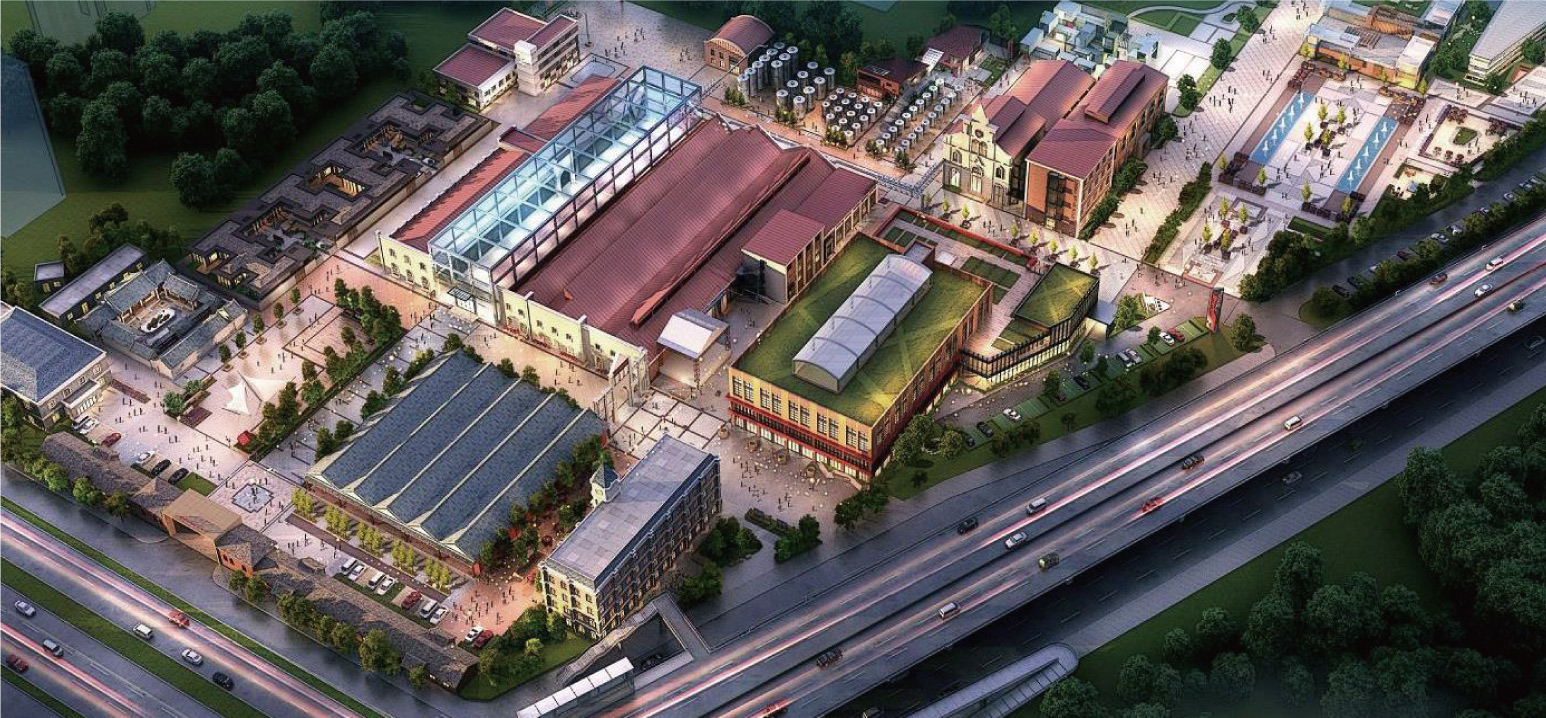
老屋再生-釀罈北京歲月,延續老酒廠的醉人芬芳
Regeneration of old housed- brewing in Beijing years, continuing intoxicating fragrance of the old winery
僻靜林蔭路一側,大面金屬格柵牆外,藏酒木盒錯落有致地穿插其中,陽光穿透至後方頗具年代感的廠房式建築上,在不同皮層之間映照出熠熠光影,呈現飽含深度的立面質地。本案「MIBA釀酒大師藝術館」位於北京市中心,為古典俄式結構的工業建築遺址。它本是中國老牌龍徽葡萄酒的縮影,身軀經歷了風雨滄桑,最終因著汰舊換新而退役。隨後,一群人找到這個榮光斑駁的容器,重新置入靈魂,憑藉原址舊酒廠那濃濃的建築時空場域,以當代的設計手法重新型塑,企圖創造更多各種酒與人、或是人與人的交流空間。昔,它是人們在精神與物質的相互作用下,進行充滿激情與活力的勞動創造;今,它將重新加載這份精神,將中國釀酒文化延伸。
Secluded side of the road, outside of a large panel of metal grille wall, wine boxes orderly misplaced and interspersed among them, sun light penetrates to an aged factory building in rear, showing the depth of the elevation texture. This project, the Museum Of International Brewmasters Art, locates in the center of Beijing, a ruin of classical Russian structural industrial building. It is an epitome of a Chinese old brand, Dragon Seal Red Wine, experienced the vicissitudes of times and finally retired cause by out of date. Afterward, a group of people found this mottled container, repositioned the spirit with the dense sense of spatial presence of the old winery, reshaped by contemporary design techniques, trying to create more interacting spaces of wine and people, or people and people. Now, it will reload the spirit and extend the Chinese wine culture.
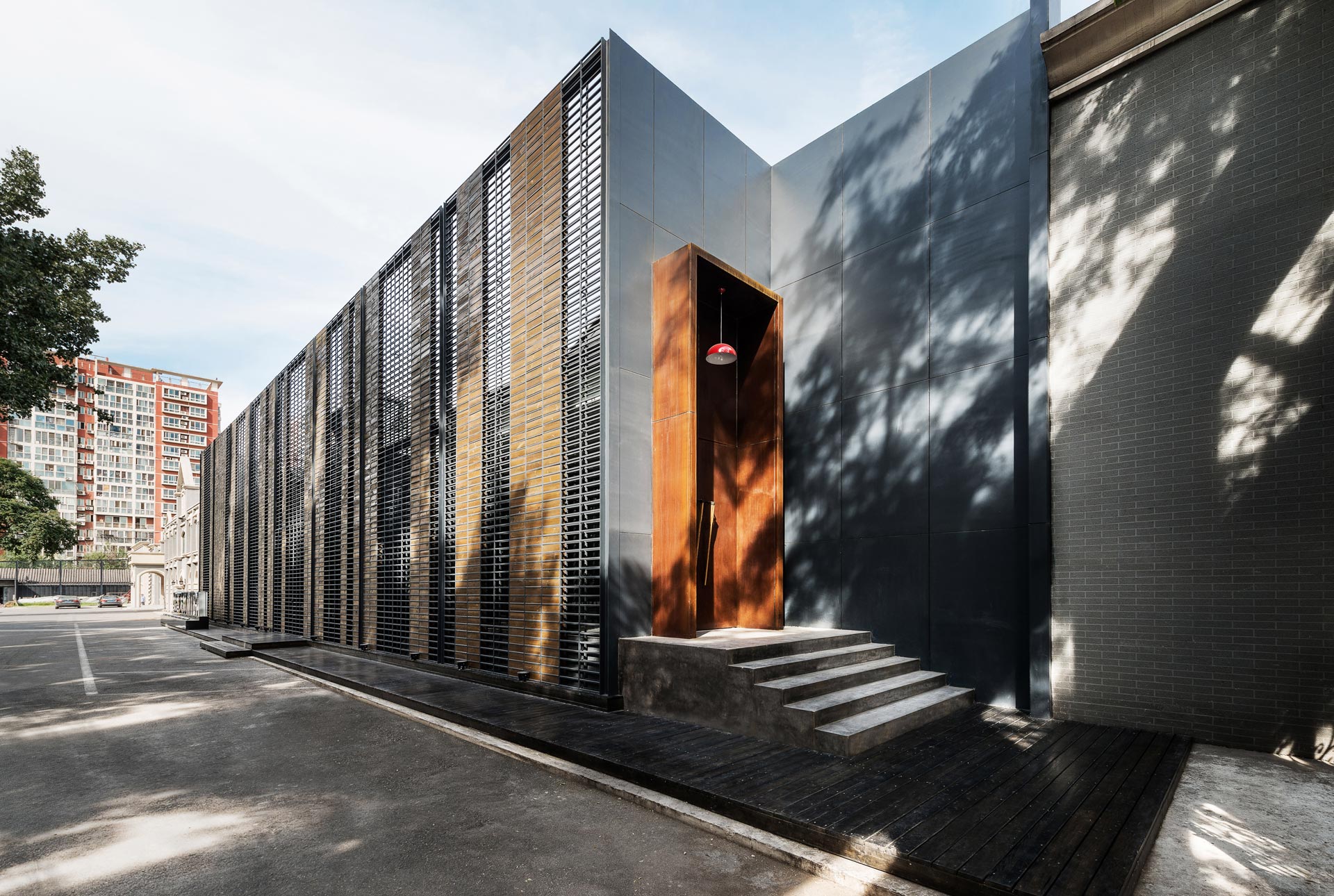
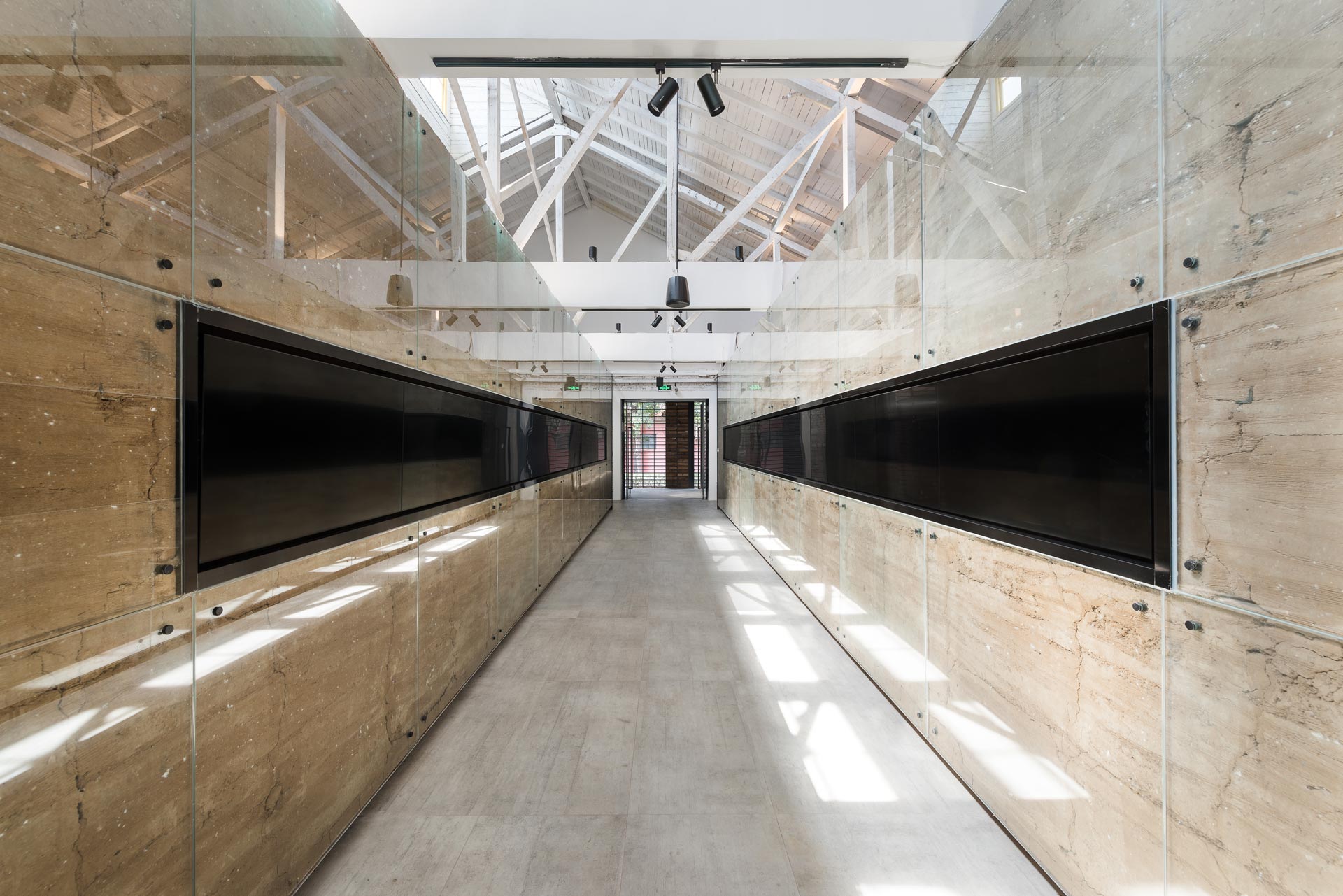
解構串聯-以釀酒為概念,串接破除的實體空間中介
Field tandem- wine-making as the concept, connecting shattered solid space as intermediary
酒的誕生,是老祖宗智慧的結晶,結合了土地、流水、火氣、糧食等元素,傾注最重要的光陰,才能孕育出令人激賞的酒品。我們將這番渾然天成的釀造過程配搭空間格局,形成了「土、水、火、糧」四個場域;而每個空間因應機能的不同所產生的精神寓意也不同。因而空間與動線規劃就以土、水、火、糧的釀酒製程為發想,在豐富、多樣的場域中蘊藏動態的時序性。推開隱身於隔柵立面內的大門,首先進入以「土」為主題的空間。土地是萬物的母親,它也是古窖泥,每一克的古窖泥裡含有幾百種到數億個參與酒液釀造的微生物。我們透過兩道以土方夯實的牆面矗立其間,營造出以時序排列的展示長廊,夯土牆內側長形空間則作為大師釀酒工作室,供教學、傳習、展示使用。接著,「水」的展演方式是企圖打破傳統酒類展示的一成不變,開鑿翻新的舊渠道形成一道汨汨流淌的靜謐水景,運用流水、光影來催生情境,將這「釀酒的血液」以軸線方式延伸至象徵「火」的酒吧區。
The creation of wine is the fruit of the wisdom of our ancestors, combined with soil, water, fire, grain and other elements, spending the most important time in order to brew an exciting wine. We make this totally natural brewing process to match spatial patterns, formed "soil, water, fire, grain" four fields, each space due to the different function resulting in different spiritual meanings. Therefore, the planning of space and circulation uses soil, water, fire, grain brewing process as conceptual developing, containing dynamic timing in the rich and diverse field. Opening the door hiding from the elevation of grills, first enters the "soil" as the theme of space. The soil is the mother of all things, also ancient pit mud, each gram of ancient pit mud contains hundreds of hundreds of millions of microbes involved in wine brewing. Two earth trowel walls standing in between, create a display gallery in a timetable, rammed earth wall inside the elongated space as a master wine studio for teaching, training, display use. After that, the performance of "Water" is in an attempt to break the traditional Immutable wine display, forming a flowing quiet water feature by cutting and refurbishing the old channel, using of water, light and shadow to catalyze situations, extending "the blood of wine" the axis to the bar area, symbolic of "fire".
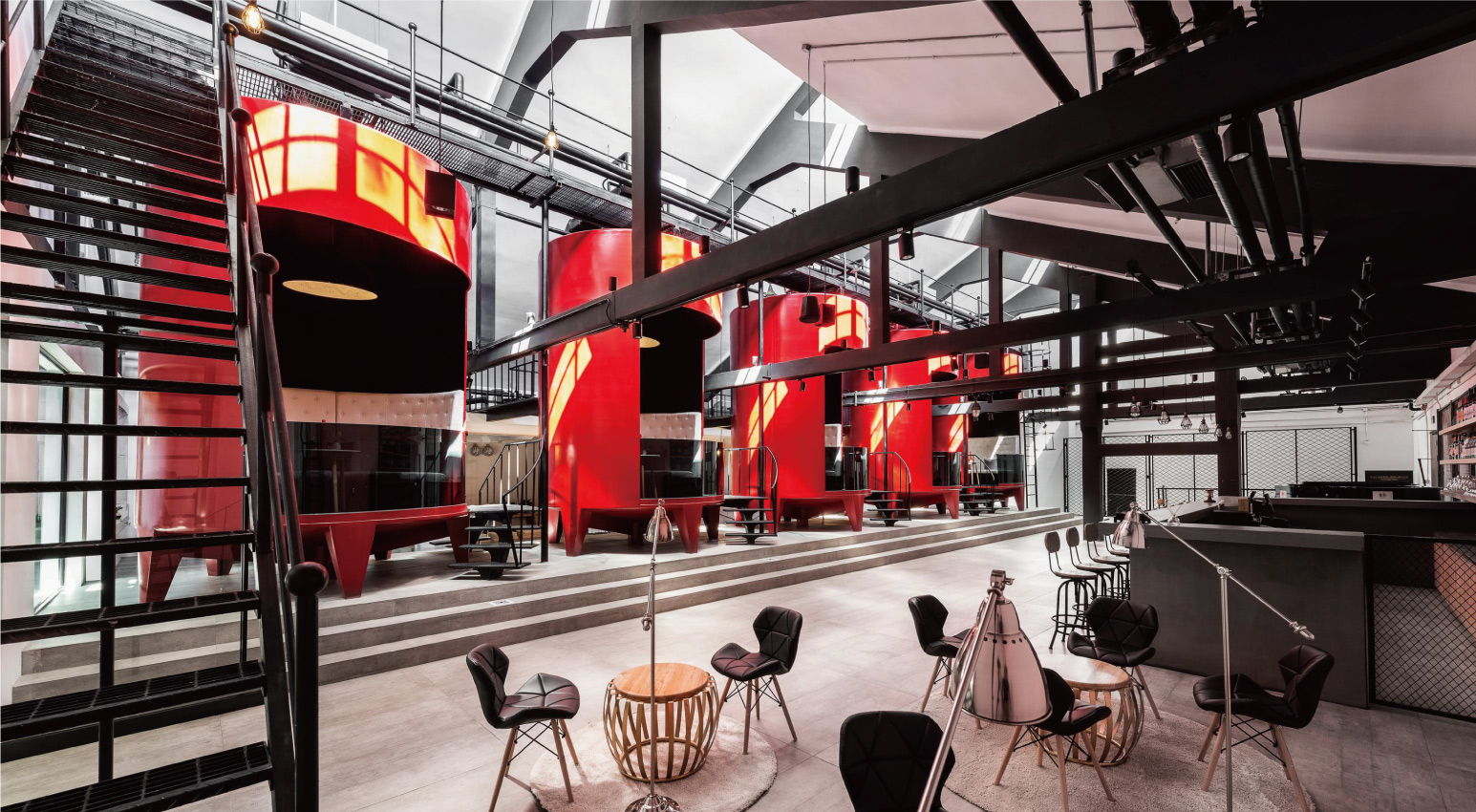
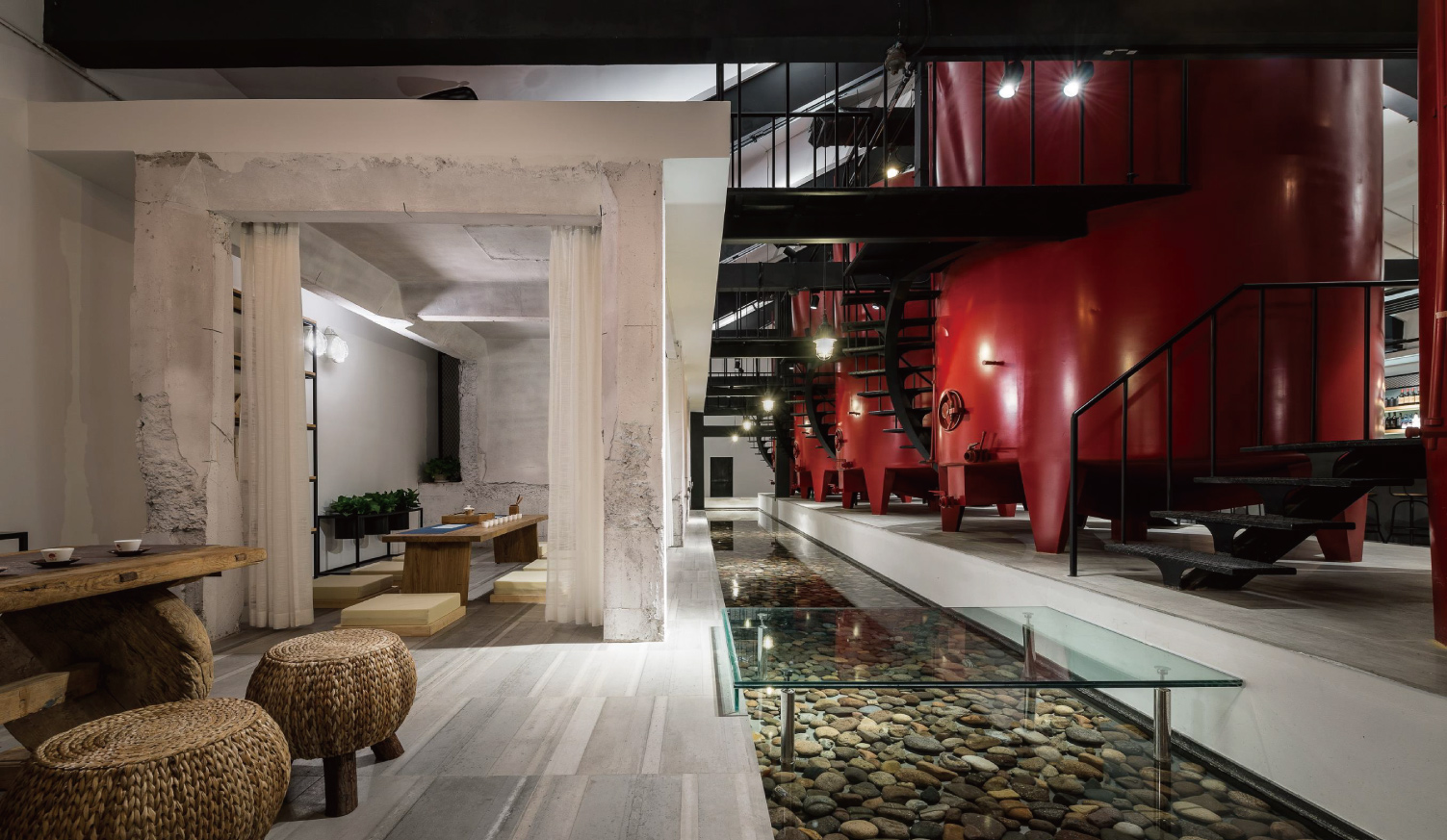
復舊再興-保留舊時構築肌理,賦予當代思維的場所精神
Rejuvenation-keeping the old building texture, giving the spatial spirit of contemporary thinking
一旁以「火」為概念設計的酒吧區,保留該區原有的大型儲酒槽,它們是中國特有的詩酒文化催生地,在這象徵水與火共生交融的空間中,人們可雅獨酌,亦不妨酣耳熱,充分體現出中國人愛酒的真性情,酒杯裡既藏著政客的權謀,亦有小民的生活,舉杯談笑間喚起庶民酒鄉情,人間百態盡在觥籌交錯之間。因此,我們匠心獨運地將其改裝為一幢幢的獨立包廂,再巧妙的透過天橋的置入,活化了二樓坐席、茶室與藏酒酒窖。
館廠的最後,以「糧」作為曲終奏雅的高潮。一地有一地之糧,於是一地有一地之酒,白高粱或紅葡萄,各是濃縮一個地方特色最精華的滋味兒;酒廠所產之酒或許可運至他方,然而老酒廠的記憶卻只能獨鍾於此地。於是我們擷取「糧」的意象為藝術展廳的襯底,空間中本身就存在著一種秩序,上面留有特殊的舊五金,在這被整理過的純白空間中,強烈的新舊對比下,企圖衝撞出藝術展廳的當代性。不以完全的「舊」來表達廢墟美,而是以曖昧模糊的手法去創造另一個「新」。
白色基調的空間內,舊時釀酒所需的圓形開口被轉化為展品與觀者互動、對話的構件,增添了空間的自明性。二樓則設置開放性宴客場所,以「觀戲」為概念,藉大型傳統戲劇掛畫,營造新融合舊,現代中帶有深厚文化底蘊的大器空間。萬物皆有其終始,生生不息,以酒的生命歷程,觀者經歷了建築的過去,亦體驗它所被賦予的嶄新面容,釀酒如建築,有如時空凝聚的結晶。
One side of the bar area, "fire" as design concept, keeps the original large storage tank in the area, the unique birthplace of poetry and wing culture, in this blending area symbiotic of water and fire, people can drink alone elegantly, or drink well, fully showing the true Chinese temperament of loving wine, politician's trickery, small people's life, nostalgia situation of common people arouse by toasting and laughing, hundreds of kinds of humanity all hidden in glass. Therefore, we ingeniously transform into separated boxes and cleverly imbed flyovers to activate the second-floor seating, tea room, and wine cellar.
The last of the museum, "grain" as the culmination of the end of the song, one grain for one land, thus one wind for one land, sorghum wine and red wine, is the most concentrated taste of each local favor. The wine produced by the winery may be shipped to other places, however, the memory of the old winery can only stand here alone. We capture the image of "grain" for the art gallery where existing order in place and special old hardware left behind, strong contrast between old and new in this sorted out white space, tries to collide the contemporary nature of the art gallery, not expressing the beauty of the ruin by completely “old” but in an ambiguous way of creating another "new".
In the white tone of space, the round openings required for the old winery are converted into the interacting and making dialogue members for the exhibition and viewers, adding the self-evident nature to space. Open banquet places set up in the second floor, “watching the play” as the concept, create a fusion of new and old by hanging large traditional drama painting, a modern space but with deep cultural heritage. Everything has its end, life and growth in nature, from the life cycle of wine, viewers experience the past of architecture and the new phrase of given, brewing wine just as architecture, as the condensation of times.
